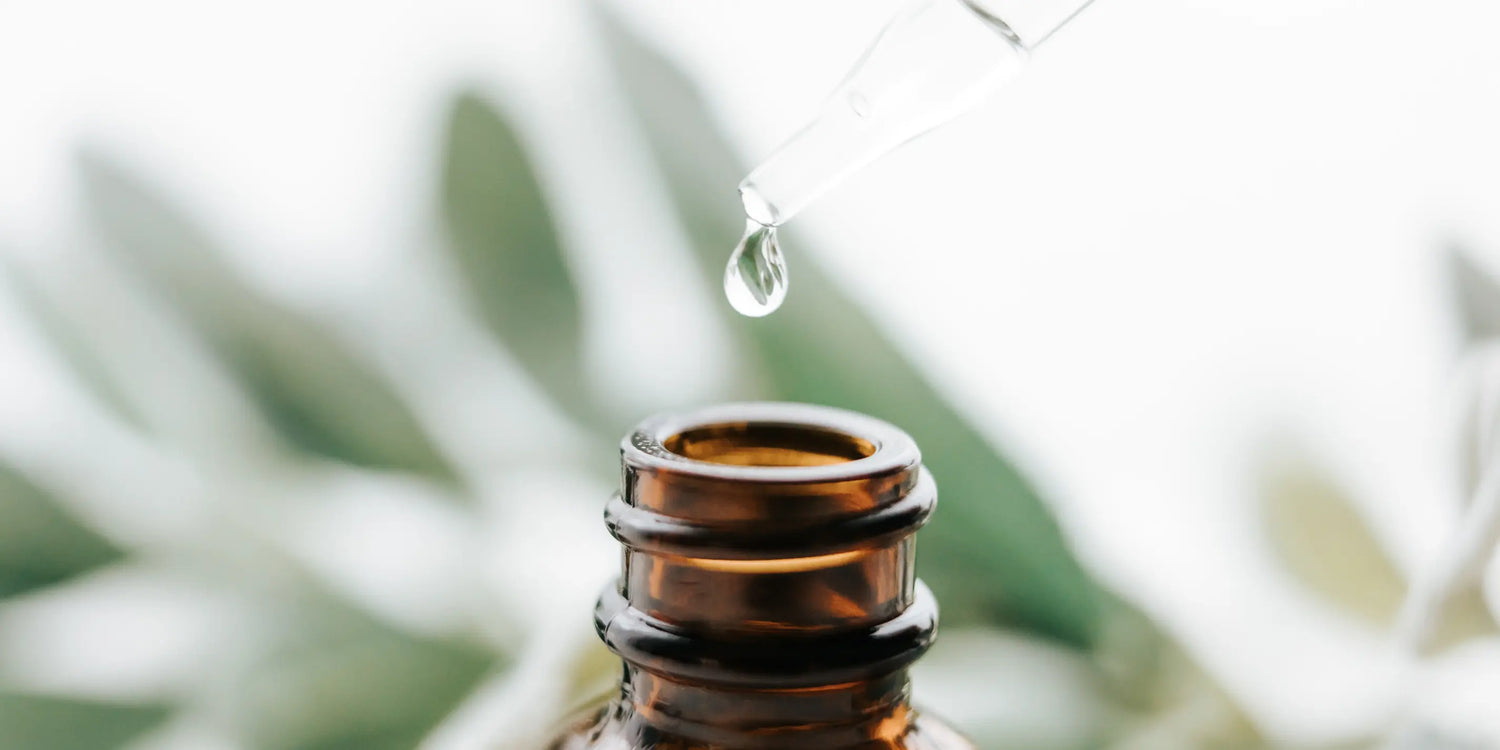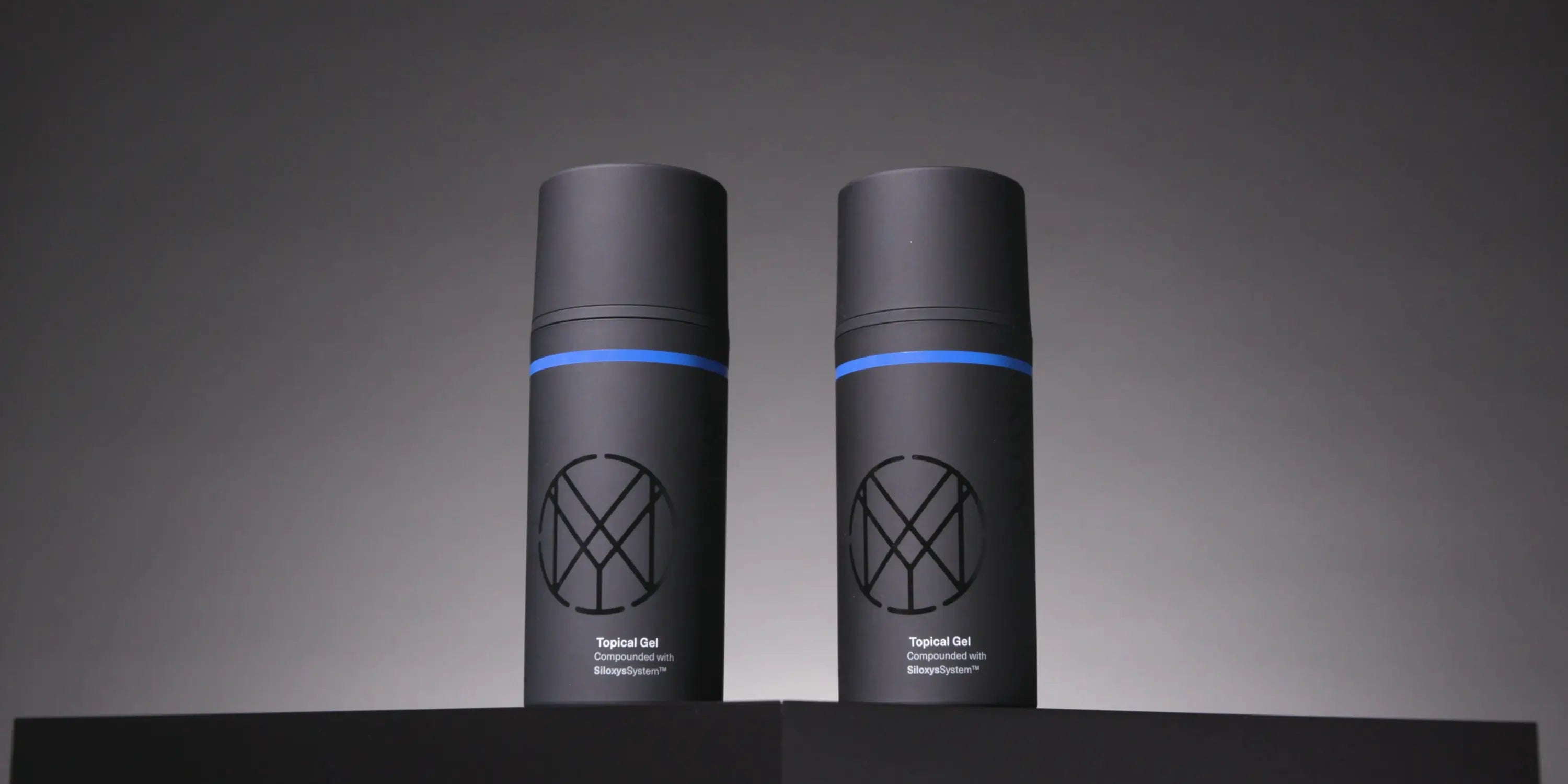Essential oils have powerful, natural ingredients that have been used for centuries in hair care to promote growth, improve scalp health, and enhance texture. Extracted from plants through methods like distillation or evaporation, these oils are renowned for their aromatic qualities and potent chemical properties that support overall health and wellness.
At XYON, we’re dedicated to providing science-backed solutions for healthier, fuller hair. That’s why we’re excited to explore how certain essential oils, when properly diluted, can contribute to your hair care routine. From stimulating growth to nourishing your scalp, essential oils offer a natural and effective way to elevate your hair health.
In this post we review the best essential oils for hair growth, their unique benefits, and how to use them to improve your scalp and hair health.
If you’re looking to incorporate natural oils into your hair routine with the hopes of elevating your growth and thickness, it’s first helpful to understand the difference between the various oils that you’ll come across. The two key types are essential oils and carrier oils. This distinction is crucial when it comes to using oils on your scalp and hair safely and effectively. So, what is the difference?
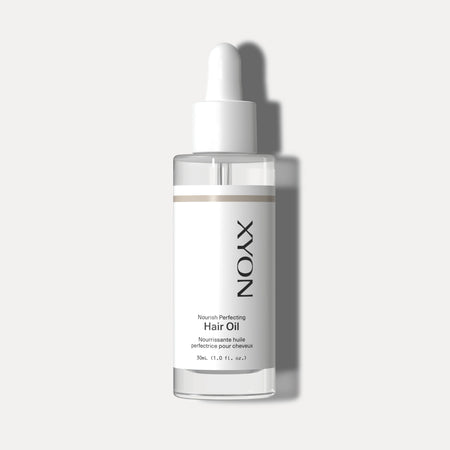
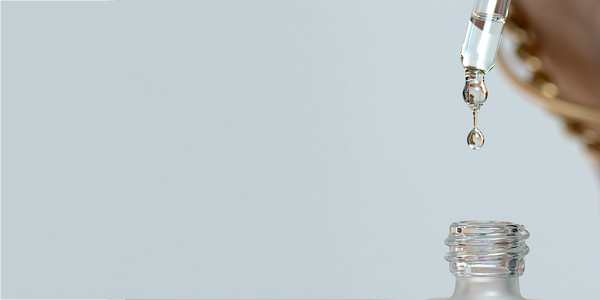
XYON's hair oil contains carefully selected oils to improve scalp health and hair growth
The XYON medical team evaluated which oils to include in it's hair oil, selecting those that would be the most beneficial for hair growth
Essential oils vs carrier oils for hair growth
Essential oils are extracts which come from aromatic plants and they are very potent (or highly concentrated) substances. Because of this, it’s generally not safe to apply pure essential oils to your skin or hair and instead, they should be diluted. This can sometimes be done using carrier oils, which are fatty extracts that come from the seeds of plants. They’re much less potent than essential oils, so they’re often used to deliver highly concentrated substances safely, hence the name ‘carrier oil’.
However, whilst carrier oils can be useful mediums for other substances, they may also carry benefits of their own, including hair growth.
We’re going to break down all the essential oils and carrier oils we could think of which have been associated with hair growth. We’ll get into the relevant research surrounding each oil and debunk any misconceptions. Consider this as your ultimate guide to the best oils for hair growth and thickness.
Carrier oils for hair growth
1. Argan oil
The first carrier oil to make the list is argan oil and if you’re someone who is interested in hair care, you’ve likely come across this oil before. It’s extracted from the argan tree, which is native to Morocco and is believed to a have a whole range of benefits when it comes to hair and scalp care. But how much of it is supported by scientific evidence?
Well, argan oil is known to be rich in vitamin D and E, which both have antioxidant properties, likely making it a beneficial product for the scalp. Research found that pretreating hair with argan oil prior to exposing it to oxidative stress can significantly decrease protein loss, thus proving argan oil to be an effective antioxidant (Sharifi et al, 2022). It’s worth noting that this study was performed on human hair that was no longer attached to the scalp, so it provided no insights to the impact of argan oil on scalp.
Argan oil also contains oleic and linoleic acid, which are types of fatty acids known to stimulate hair growth and support a healthy scalp. In fact, research has found that linoleic may be a useful compound for treating pattern baldness, with proven abilities to promote growth factors and inhibit pathways involved in pattern balding (Ryu et al, 2021).
When it comes to argan oil's ability to directly promote hair growth, there is limited research available. However, one study done on mice found that a topical tonic containing concentrated argan oil promoted hair growth after 21 days of application (Rahmassari et al, 2022). Further research on humans is needed to determine whether argan oil can truly help hair grow.
2. Coconut oil
Another popular carrier oil that you’re likely to have come across is coconut oil. It’s a versatile oil, having many uses ranging from cooking to skin care, but some people also believe coconut oil to be the answer to their hair thickness. Is there any truth to this?
It appears unlikely. There doesn’t seem to be any evidence that coconut oil will make your hair grow. But that doesn’t completely discount it as a haircare product and in fact, it could be a great option if you’re looking for a smoothing and repairing product for your locks.
Research has shown that using coconut oil-based hair products can prevent gaps forming in the cuticle of your hair strands (known as high porosity), allowing hair to retain moisture and prevent dryness (Kaushik et al, 2022). In some cases, it may even reverse damage to the strands by reducing protein loss (Rele & Mohile, 2003).
So, the bottom-line is, coconut oil won’t make your hair grow but it may help with damage and smoothness.
3. Jojoba oil
Jojoba oil comes from the seeds of the jojoba plant and it contains lots of long-chain fatty acids and esters, which are like those found in the sebum (waxy, oily substance) naturally produced by your scalp. Because of this similarity, it can be applied directly to the scalp and is well-absorbed, providing good moisturization.
Jojoba oil is used in a range of pharmaceutical preparations because of its known medicinal benefits, including anti-inflammatory, anti-bacterial and anti-microbial properties. Studies have also shown that jojoba oil can enhance the elasticity of the skin and promote thickening of the keratin layer, therefore supporting strong and healthy hair (Wisnaik, 1994).
As far as we can find, there’s no direct evidence of jojoba oil promoting hair growth, so its benefits may be limited to moisturizing and strengthening the hair strands.
4. Olive oil
Turns out olive oil may have more uses other than making your food taste great. Much like argan oil, olive oil is rich in oleic acid, giving it antioxidant properties. It is also known to be an anti-inflammatory substance, with one study finding it to be an effective treatment for scalp psoriasis when combined with honey and applied topically to the scalp (Venkataram & Arpita, 2022). This is likely down to the anti-inflammatory properties of olive oil since scalp psoriasis is an autoimmune disorder.
However, it’s worth noting that some professionals believe that olive oil may exacerbate dandruff and other fungal scalp problems, so it’s definitely worth asking your doctor if you’re considering using olive oil on your hair, particularly if you have a history of dandruff. When it comes to hair growth, olive oil doesn’t appear to have any properties that would help your hair grow.
5. Castor oil
Castor oil is known as a stimulant laxative, but more recently it’s gained traction in social media for its supposed de-bloating and detoxing powers, when applied to the stomach. But does castor oil really have this ability when used on the skin and if so, what can it do for the scalp?
Experts dispute castor oil's role in de-bloating when not ingested, however there does some to be some evidence that it could benefit your scalp and hair. Because its composition is rich in ricinoleic acid and fatty acids, it may be moisturizing and nourishing for the scalp. One study done on rabbits also found that applying 30-40% castor oil lotion increased the length, thickness and softness of the fur compared to the control group (Kporou et al, 2021). But much like other oils, further research on human hair is needed to definitively rule castor oil as a beneficial hair growth ingredient.
6. Almond oil
Almond oil consists of monosaturated fatty acid, linoleic and oleic fatty acids, which have been proven to protect the hair against damaging UV radiation and structural damage. This is because these fatty acids are rich in double bonds (Sultana et al, 2007). However, the composition of almond oil means that it is unable to penetrate the hair shaft and therefore it’s unlikely to have any impact on hair growth.
7. Avocado oil
Unlike most carrier oils which come from seeds, avocado oil is actually squeezed out of the flesh of an avocado. It’s rich in antioxidants, vitamins and minerals, including biotin which is known to be a useful ingredient for hair health. The most effective way to incorporate avocado oil into your haircare routine is through diet, but it can also be applied topically. Whilst there’s no research looking at avocado oil on scalp hair, there is some evidence that it may have regenerative properties on damaged hair cells in the inner ear (Park et al, 2022). Given that this was an animal study and didn’t look at scalp hairs, it would be a stretch to claim that avocado oil is scientifically supported for hair growth, but it certainly has some promising ingredients and we may learn more about its use in the future.
8. Grapeseed oil
Grapeseed oil is packed full of beneficial compounds, such as polyphenols and linoleic acid. Although the research is preliminary, there is some evidence to suggest that some of the compounds in grapeseed oil could promote hair growth. For example, proanthocyanidins (a type of polyphenol found in grapeseed oil) was found to promote hair follicle growth in mice, as well as promoting the transition from the resting stage to the growing stage of the hair growth cycle (Takahashi et al, 1998). Whilst this research was carried out on mice, it shows promising initial results to support grapeseed oil for hair growth and makes a strong argument towards carrying out further research to better understand the hair growth properties of this oil.
9. Pumpkin seed oil
Pumpkin seed oil is relatively well-supported in the natural hair loss space, with strong evidence to support pumpkin seed oil as a natural DHT-blocking agent. It’s DHT-blocking properties appear to be down to a substance known as beta-sitosterol and it’s proven to be effective at treating both male and female pattern hair loss. In fact, men with pattern balding found a 40% increase in mean hair count when taking pumpkin seed oil supplements (Cho et al, 2014). When used as a topical treatment, pumpkin seed oil significantly increased upright hair growth in women with pattern balding after 3-months of application (Ibrahim et al, 2021).
So, pumpkin seed oil may be a good option for you to add into your routine if you’re worried about pattern balding, but it’s important not to rely on this oil alone for treatment. Instead, it may act as a great adjunct therapy, alongside a clinically proven hair loss medication.


Our medical team evaluated which oils genuinely help hair for our nourishing hair oil
Our lightweight formula is packed with oils that protect hair from the elements, while softening, smoothing, and restoring your hair’s natural shine
Essential oils for hair growth
1. Rosemary oil
The first, and potentially best essential oil for hair growth to make the list is rosemary oil. Known for its DHT-blocking, antioxidant, anti-inflammatory and blood flow enhancing properties, rosemary oil is potentially the most well-supported oil out there for hair growth.
It seems to be similar to minoxidil in its ability to promote new blood vessel formation at the scalp (known as angiogenesis), which enhances the supply of oxygen and other essential nutrients to the hair follicles. When directly compared to minoxidil in a human study, rosemary oil was found to produce similar hair growth results (Panahi et al, 2015).
In addition to enhancing blood flow at the scalp, rosemary oil is also a natural DHT-blocker, with evidence that it can reduce the activity of the enzyme that converts testosterone into DHT by up to 80% (Murata, 2012). This makes it a potentially beneficial ingredient to add to your routine if you struggle with pattern balding.
2. Tea tree oil
Tea tree oil has been used in traditional medicine for centuries and many of its medicinal and therapeutic properties seem to be derived from one compound known as terpinen-4-ol. When it comes to hair growth, there isn’t much research to suggest that tea tree oil is the answer, but it may be helpful for soothing some types of dandruff. It has antifungal properties which have been found to be effective at combatting dandruff caused by a type of fungus called Pityrosporum Ovale (Satchel et al, 2002).
3. Peppermint oil
The main component of peppermint oil is menthol, which is known to improve blood flow to the scalp when applied (Craighead & Alexander, 2017). This can help to promote hair growth by improving the flow of oxygen and nutrients to the hair follicles, as with minoxidil. In fact, when directly compared to minoxidil, peppermint oil induced thick and long hair growth in mice in a quicker time-period (Oh et al, 2014).
Further research on human hair is needed to rule peppermint oil as a truly beneficial oil for hair growth.
4. Lavender oil
Best known for its relaxing effects, lavender oil may also have some hair growth benefits, though more research would be needed to say for sure. But from the literature available, we know that lavender oil is an anti-inflammatory and antimicrobial substance, so it may be useful (when diluted) for soothing the scalp and helping to reduce any inflammation around hair follicles. In terms of direct hair growth properties, one mouse study found that using 5% lavender oil solution significantly increased hair follicle count (Lee et al, 2016). This seems to be the only study linking lavender oil to hair growth, so further research is needed to determine whether it truly has these effects on human hair.
5. Saw palmetto oil
Saw palmetto oil contains antioxidant and anti-inflammatory properties which can help to promote hair growth, as well as having natural DHT-blocking properties. The combination of these effects makes it a potentially useful oil to add into your haircare routine, particularly if you struggle with hair loss. Research has demonstrated saw palmetto to be an effective treatment for both androgenetic alopecia and telogen effluvium, though further research is needed (Evron et al, 2020).
6. Chamomile oil
Chamomile oil has long been used for medicinal purposes, dating back to ancient Egypt where it was used to treat a variety of ailments, ranging from digestive issues to anti-inflammatory and pain relief purposes. More recently, it’s been suggested that chamomile oil could promote hair growth through enhancing blood circulation and boosting collagen production. But what does the research say? Well, we know chamomile oil is rich in vitamins C and E, as well as other antioxidants and this composition likely means that it may provide good protection for your hair strands against damaging UV rays. However, there doesn’t seem to be any direct evidence of chamomile oil promoting hair growth. Perhaps more research in the future will reveal more about this essential oil.
7. Cedarwood oil
The beliefs surrounding cedarwood oil for hair growth seem to be based on similar scientific theories that it can promote blood flow and exchange of essential nutrients around the scalp and hair follicles. But as with many other oils, the research is very limited with only one study (that we could find) potentially supporting cedarwood oil for hair growth. The takeaway from this study is also very limited because it didn’t look at cedarwood oil alone and instead, it was a small portion of a combination of oils applied to the hair and scalp. Nevertheless, the solution was found to be an effective treatment for alopecia (Hay et al, 1998).
From the literature available, it’s impossible to say whether cedarwood oil can promote hair growth. So, if you’re looking for help growing your hair, we recommend sticking to the proven methods.
8. Geranium oil
Previously used in some countries as a treatment for infection, diarrhea and even cancer, geranium oil has a history of supposed medicinal benefits. But some research has also suggested that it could have some hair growth properties. For example, a mouse study found that topical application of geranium oil promoted more significant hair growth after 3 weeks, compared to minoxidil. It was noted that the oil seemed to promote cell growth and enhance expression of growth factors, including VEGF (vascular endothelial growth factor) in human dermal papilla cells (Boisvert et al, 2017).
Future, more extensive research would be beneficial to confirm these findings.
9. Lemongrass oil
Lemongrass could be a beneficial oil for your scalp, particularly if you struggle with dandruff. This is because its main components have anti-inflammatory and antifungal properties. When a tonic containing 10% lemongrass oil was applied topically to the scalp, it significantly reduced dandruff after 7 days and even more so after 14 days (Chaisripipat et al, 2015). While lemongrass oil could be a potential option if you’re experiencing dandruff or worried about inflammation, it doesn’t seem to offer any direct hair growth benefits. So, if it’s hair growth that you’re after, lemongrass oil probably isn’t the right choice.
10. Sage oil
When it comes to natural remedies for hair growth, sage oil certainly shows some potential. Like most oils, the research is in the preliminary stages, but the available research does seem to suggest that sage oil may actually have a direct effect on hair growth.
During a study using extract from a certain type of sage plant on cells found on the human scalp, it was discovered that the extract significantly increased the growth of these cells and even initiated a key signaling pathway involved in hair growth (Jin et al, 2020). This pathway is known as Wnt/β-catenin signaling and it plays a major role in regulating the development and regeneration of hair follicles.
When using the same extract on mice, it was found to induce the active growth stage (anagen) of the hair growth cycle and significantly increased hair growth. It would be useful to find out whether these same effects are produced on human hair.

So, which oils actually help hair grow?
Now that we’ve broken down each oil, you’re probably wanting to know which oils are actually worth trying. As you might’ve gathered, there isn’t a single natural oil that is 100% backed by scientific research, but this doesn’t necessarily mean that none of them are worth adding into your haircare routine. In fact, for those suffering from pattern hair loss, adding a natural hair growth remedy alongside your prescribed medication can often be a great idea.
Depending on your hair goals, you will be looking for different things out of a natural oil, so it’s important to understand the main properties to look out:
- DHT-blockers
- Enhances blood flow to the scale
- Regulates the hair growth cycle
- Antifungal/anti-inflammatory (scalp health)
You’ll likely only want an oil with DHT-blocking properties if you suffer from pattern balding or have a family history of this type of hair loss.
Best DHT-blocking oils
Rosemary oil is a great go-to ingredient to look out for if you’re wanting to give your hair loss treatment that extra boost. With evidence that this oil can block up to 80% of the enzyme producing DHT, rosemary oil is included in XYON’s DHT-Blocking Shampoo to act as the perfect supportive therapy alongside your medication. Saw palmetto is another oil believed to have DHT-blocking properties and it’s another good ingredient to look out for when you’re shopping for your next haircare products. In fact, you’ll also find this beneficial ingredient in our DHT-Blocking Shampoo and Conditioner for men.
You might also consider pumpkin seed oil when looking for a natural DHT-blocking agent. Its natural component known as beta-sitosterol is found in XYON’s hair & scalp serum and this is what gives pumpkin seed oil its DHT-blocking effect. A serum is a great way to add even more natural hair growth ingredients into your routine, giving you the opportunity to take that extra step beyond shampoo and conditioner.

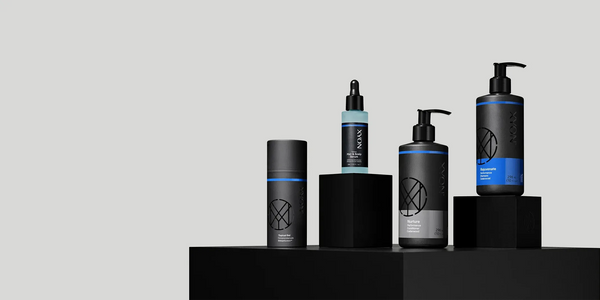
XYON offers DHT blocking hair serum and shampoo
Our DHT blocking shampoo and hair serum are designed with the best natural ingredients known to block DHT, the most common cause of hair loss
Which oil is best for hair growth and thickness?
If you’re looking to enhance the growth and thickness of your hair and you’re not someone who is experiencing hair loss, it’s a good idea to look for oils that support the health of your scalp and hair follicles. So, oils that enhance blood flow to the scalp, allowing more oxygen and essential nutrients to reach the hair follicles, are the ones to look for. Here are some oils that are believed to naturally enhance blood flow:
- Rosemary oil
- Peppermint oil
- Tea tree oil
- Chamomile oil
- Cedarwood oil
There are also a select few oils which are believed to have a direct effect on regulating the hair growth cycle. We don’t currently have enough scientific evidence to claim that these oils will definitely help your hair grow, but it’s certainly worth knowing which ingredients you may want to keep an eye out for. These include the following:
- Grapeseed oil
- Geranium oil
- Sage oil
Another thing to remember is that your scalp has its own ecosystem of microorganisms and keeping a healthy balance of these microbes is essential to maintaining a healthy scalp. Some oils believed to have antifungal and anti-inflammatory properties include:
- Lemongrass oil
- Coconut oil
- Rosemary oil
- Jojoba oil
- Olive oil
- Tea tree oil
- Chamomile oil
How to use oils for hair growth
The safest and most effective way to add natural oil for hair growth into your routine is through tried-and-tested hair products that contain these ingredients. Looking for shampoos, conditioners and serums specifically designed to help your hair grow is a good way to ensure that you’re using these oils in a way that is good for your hair. It’s important to remember that essential oils are very concentrated and using them incorrectly has the potential to be very damaging to your hair and scalp. Rarely, essential oils can also cause an allergic reaction so consider testing on a small area first before widespread application
At XYON, we want to make sure that your hair is getting the most out of every product you use. This is why we have designed a range of products containing the most beneficial ingredients that will support your hair throughout your growth journey. If you want to learn more about our products or you’re worried about thinning hair, book a consultation with one of our hair loss specialists. They’re here to answer any questions or concerns that you might have when it comes to your hair and give you the expert guidance you need to make those next steps in your haircare journey.
Takeaway
As we’ve seen, there’s a wide range of oils that can potentially benefit hair growth, but understanding the unique properties of each oil may help you to make an informed decision when selecting your next haircare products. Adding these natural ingredients into your routine can be a great way to promote hair growth and in some cases, complement treatments for hair loss. While not all oils are backed by strong scientific evidence, there are a few, like rosemary oil, that have compelling studies supporting their supposed hair benefits. As research continues to emerge, it’s likely that we will continue to learn more about how these natural ingredients can contribute to hair health and even promote growth.
Dr. Christina Han, MD FRCPC
Canadian and U.S. board-certified Dermatologist
XYON: Medical Director
Education
Dermatology (Postgraduate Residency) — University of British Columbia (UBC), Canada — 2012
Doctor of Medicine (MD) — University of British Columbia (UBC), Canada — 2007
Bachelor of Science (BSc), Microbiology & Immunology — University of British Columbia (UBC), Canada — 2002
Additional Training
Additional dermatological training — Yonsei University, Seoul
Focus areas: dermatological and laser surgery; skin cancer treatment
Board Certification
Canadian board-certified dermatologist
U.S. board-certified dermatologist
References:
Boisvert, W.A., Yu, M., Choi, Y., Jeong, G.H., Zhang, Y.L., Cho, S., Choi, C., Lee, S., Lee, B.H. (2017). Hair growth promoting effect of Geranium sibircum extract in human dermal papilla cells and C57BL/6 mice. BMC Complementary Medicine and Therapies. 17. 28193226
Chairsripipat, W., Lourith, N., Kanlayvattankul, M. (2015). Anti-dandruff hair tonic containing lemongrass (Cymbopogon flexuous) oil. Forshendo Komplementarmedizin, 22(4). ;10.1159/000432407]
Cho, H.Y., Lee, S.Y., Jeong, D.W., Choi, J.E., Kim, Y.J., Lee, J.G., Yi, Y.H., Cha, H.S. (2014). Effect of pumpkinseed oil on hair growth in men with androgenetic alopecia: a randomized, double-blind, placebo-controlled trial. Evidence-Based, Complementary and Alternative Medicine. https://doi.org/10.1155/2014/549721.
Craighead, D.H., Alexander, L.M. (2017). Topical menthol increases cutaneous blood flow. Microvascular Research, 107. 27131832
Evron, E., Juhasz, M., Babadjouni, A., Mesinkovska, N.A. (2020). Natural hair supplement: friend or foe? Saw palmetto, a systematic review in alopecia. Skin Appendage Disorders, 23(6). 10.1159/000509905
Hay, I.C., Jamieson, M., Ormerod, A.D. (1998). Randomized trial of aromatherapy. Successful treatment for alopecia. Archives of Dermatology, 134(11). 10.1001/archderm.134.11.1349
Ibrahim, I.M., Hasan, M.S., Elsabaa, K.I., Elsaie, L.E. (2021). Pumkinseed oil vs minoxidil 5% topical foam for the treatment of female pattern hair loss: a randomized comparative trial. Journal of Cosmetic Dermatology, 20(9). 10.1111/jocd.13976
Jin, G.R., Zhang, Y.L., Yap, J., Boisvert, W.A., Lee, B.H. (2020). Hair growth potential of Salvia plebeia extract and its associated mechanisms. Pharmacuetical Biology, 58(1). 32420784
Kaushik, V., Kumar, A., Gosvami, A.A., Gode, V., Mhaskar, S., Kumath, Y. (2022). Benefit of coconut-based hair oil via hair porosity qaunitification. International Journal of Cosmetic Science, 44(3). 10.1111/ics.12774
Kporou, K.E., Moussa, G., Sitapha, O., Djaman, J. (2021). Quality, safety and activity of an ointment formulated parkii and Ricinus communis oils on rabbits' hair growth. Serie Pharm. Med. Trad. Afr., 20(1), 38-46.
Lee, B.H., Lee, J.S., Kim, Y.C. (2016). Hair growth promoting effects of Lavender oil in C57BL/6 mice. Toxicological Research, 32(2). 10.5487/TR.2016.32.2.103
Murata, K., Noguchi, K., Kondo, M., Onishi, M., Watanabe, N., Okamura, K., Matsuda, H. (2012). Promotion of hair growth by Rosmarinus officinalis leaf extract. Phytotherapy Research, 27(2). https://doi.org/10.1002/ptr.4712
Oh, J.Y., Park, A.M., Kim, Y.C. (2014). Peppermint oil promotes hair growth without toxic signs. Toxicological Research, 30(4). 25584150
Panahi, Y., Taghizadeh, M., Tahmsbpour, E., Marzony, T., Sahebkar, A. (2015). Rosemary oil vs minoxidil 2% for the treatment of andorgenetic alopecia: a randomized comparative trial. Skinmed, 13(1). https://can01.safelinks.protection.outlook.com/GetUrlReputation
Park, S.J., Jeong, S, Y., Nam, Y.H., Park, J. H., Rodriguez, I., Shim, H. J., Yasmin, T., Kwak, H.J., Oh, Y., Oh, M., Lee, K.W., Lee, J.S., Kim, D.H., Park, Y.H., Moon, I.S., Chuong, S.Y., Jeong, K.W., Hong, B.N., Kim, H.S., Kang, T.H. (2021). Fatty acid derivates isolated from the oils of Persea Americana (avocado) protects against neomycin-induced hair cell damage. Plants (Basel), 10(1). 10.3390/plants10010171
Rahmasari, D., Setya Fazri, Z. E., & Chasanah, U. (2022). Hair Growth Promotion of Argan Oil (Argania Spinosa Skeels) Nanoemulsion Hair Tonic Preparation With Mice (Mus Musculus). KnE Medicine, 2(3), 598–603. https://doi.org/10.18502/kme.v2i3.11913
Rele, A.S., Mohile, R.B. (2003). Effect of mineral oil, sunflower oil, and coconut oil on prevention of hair damage. Journal of Cosmetic Science, 54(2). 12715094
Ryu, H.S., Jeong, J., Lee, C.M., Lee. K.S., Lee, J.N., Park, S.M., Lee, Y.M. (2021). Activation of hair cell growth factors by linoleic acid in Malva Verticillata seed. Molecules, 26(8). 10.3390/molecules26082117
Satchell, A.C., Saurajen, A., Bell, C., Barnetson, R. (2002). Treatment of dandruff with 5% tea tree oil shampoo. Journal of The American Academy of Dermatology, 47(6). 10.1067/mjd.2002.122734
Sharifi, N., Hamezedayan, S., Shokri, J., Monajjemzadeh, F. (2022). Argan oil as a pretreatment of human hair before exposure to oxidative damage: Attenuated total reflectance and protein loss studies. Journal of Cosmetic Dermatology, 21(10). 10.1111/jocd.14885
Sultana, Y., Kohli, K., Athar, M., Khar, R.K., Aqil, M. (2007). Effect of pre-treatment of almond oil on ultraviolet B-induced cutaneous photoageing in mice. Journal of Cosmetic Dermatology, 6(1). 10.1111/j.1473-2165.2007.00293.x
Takahashi, T., Kamiya, T., Yokoo, Y. (1998). Proanthocyanidins from grape seeds promote proliferation of mouse hair follicle cells in vitro and convert hair cycle in vivo. Acta-Dermat-Venerologica, 78(6). 10.1080/000155598442719
Venkataram, M., Arpita, A. (2022). Hair oils, Indigenous knowledge revisited. International Journal of Trichology, 14(3). 10.4103/ijt.ijt_189_20
Wisnaik, J. (1994). Potential uses of jojoba oil and meal – a review. Industrial crops and products, 3(1-2). https://doi.org/10.1016/0926-6690(94)90077-9

